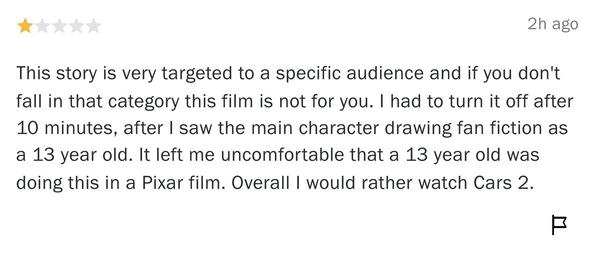“Progressive cult of ideas”: These scenes from PIXAR’s “Turning Red” have parents seeing red Sponsors
Several scenes from PIXAR’s latest release, Turning Red, have parents seeing red as they voice their anger, concern, and shock over the studios’ decision to release a film that focuses on topics like puberty that many see as simply too mature for younger audiences.
Credit: PIXAR Animation Studios
RELATED: PIXAR’s “Turning Red” echoes a similar theme with Disney’s “Encanto” (and “Soul”, “Brave”, and “Tangled”)
Turning Red is PIXAR’s first film to be solely directed by a female. It’s also the first film to ever cause such staunch controversy for the PIXAR brand, dividing the fanbase into those who see it as another great PIXAR film and those who say it’s entirely inappropriate for children.
Turning Red tells the story of 13-year-old Mei Lee, who lives in an Asian community in Toronto, Ontario, Canada with her parents. She’s a typical middle school-aged girl who loves her friends, makes good grades in school, and is happy to help her parents with chores at home.
Credit: PIXAR Animation Studios
The film follows Mei as she steps into puberty and experiences the adventures and emotions that accompany it, yielding it the classification of a coming of age film.
A scathing review of Turning Red posted to CinemaBlend by its managing director, Sean O’Connell, just days before the film‘s release was considered racist and was ultimately taken down from the website following outcry on social media and news outlets. O’Connell accused the film of being “limiting” and wrote that he couldn’t connect with it.
“By rooting Turning Red very specifically in the Asian community of Toronto, the film legitimately feels like it was made for [director] Domee Shi‘s friends and immediate family members,” O’Connell wrote. “Which is fine, but also a tad limiting in its scope.”
But O’Connell’s distaste for PIXAR’s 25th feature-length animated film was only a predecessor to the complete fallout online from parents who are furious over the new film, saying that it focuses on topics that are too mature for PIXAR’s younger viewers, that it encourages rebellion in children, and that it suggests or introduces ideas some parents don’t want their children entertaining.
Credit: PIXAR Animation Studios
For some who’ve seen the film, however, the upset is confusing, ungrounded, and just online white noise. They want to know what scenes, ideas, topics, in the film were supposedly “too mature” or “inappropriate.” We did some searching to find out which of the film‘s scenes were met with the most upheaval, and here they are, in no particular order.
RELATED: PIXARDirectorDomee Shiand team unapologetically deal with the yikes, gross, and ick that is adolescence
Credit: PIXAR Animation Studios
Mei wakes up one morning to discover she doesn’t look like herself at all, and what she sees in the mirror makes her not feel much like herself either. She has morphed into a giant red panda, and in a panic, she runs and hides in the bathroom so no one will see her. Her mother, however, immediately assumes she has begun her journey toward womanhood and races to the bathroom with ibuprofen, an assortment of feminine hygiene products, and other items.
“Did the red peony bloom?” her mother asks her reluctantly, following that with metaphorical explanations for what is going on with Mei (supposedly), telling her she needn’t be embarrassed.
Credit: PIXAR Animation Studios

“You are now a beautiful, strong flower who must protect her delicate petals and clean them regularly,” Mei’s mother continues, and though the word period is never used, the euphemisms and metaphors simply took things to far, according to many upset parents, some who feel this topic makes the film inappropriate for children.
That 'Turning Red' Disney movie is NOT appropriate for children. Yuck.
— Nadine Sandcroft-Cooper (@NadineSandcroft) March 13, 2022
In another controversial scene from the film, Mei is drawing in a notebook. It’s harmless enough. Then over the next few minutes, her drawings progressively change into illustrations of her embracing the local convenience store clerk named Tevin–the object of several of Mei’s peers’ crushes. Previously Mei barely noticed Tevin, and then, as if like a light switch, her view of him changes, and he becomes “crushworthy” to her.
Credit: PIXAR Animation Studios
Her mother finds the notebook, though, and is horrified by what Mei has drawn. One drawing depicts Tevin as a merman with no shirt, and another depicts Tevin touching Mei’s face. (It still sounds harmless to some parents.)
Credit: PIXAR Animation Studios
But the idea of a 13-year-old drawing fan fiction was extremely troubling and disturbing for some viewers, leading them to vote “inappropriate” as well.
Throughout the film, there are mentions of the popular (and fictitious) boy band 4*Town. The group is made up of 5 teenage boys who sing songs about girls, love, and the like.
Credit: PIXAR Animation Studios
Mei and her three best friends especially like the band’s song titled, “Nobody Like U,” the lyrics of which read:
I’ve never met nobody like youHad friends and I’ve had buddies, it’s trueBut they don’t turn my tummy the way you doI’ve never met nobody like youOh, yeah, yeah
You’re never not on my mind, oh my, oh myI’m never not by your side, your side, your sideI’m never gon’ let you cry, oh, cry, don’t cryI’ll never not be your ride or die, alright
Let’s call it what it is, it’s a masterpieceGotta whole lotta love for them city streetsTonight, is the place to be, gotta big boombox and a new CDCome on, everybody let’s tear it upIf you want mad skills, you can share with us(Come on) I want everybody to stop and stareAnd you know why, it’s me
Mei and her gal pals are completely enamoured by the members of 4*Town, and part of the film centers on their efforts to raise $800 for tickets to see the boys in concert. But this “boy crazy” and “obsessive” behavior is infuriating to many viewers who say they don’t want their children influenced by such ideals. One parent posted a comment online, saying “[Thirteen] and obsessed with boys may be common, but it’s not an ideal I want for my girls.”
*Spoiler Alert*
In one of the final scenes of the film, Mei has learned to embrace her inner red panda, but it’s clear that her mother is still not completely comfortable with the idea. Mei responds to her mother with, “My panda, my choice, Mom.” Clearly the phrase is a nod to the “my body, my choice” lingo used in the pro-choice movement. Some viewers were angered over the phrase, saying that a PIXAR film for children should leave out the politics.
Credit: PIXAR Animation Studios
Turning Red may well be the most controversial film PIXAR has released in its more than 30-year history. There is a silver lining, however, and that is that PIXAR’s next release is one that will come with at least some familiarity to PIXAR fans:Lightyearhits theaters in June!







